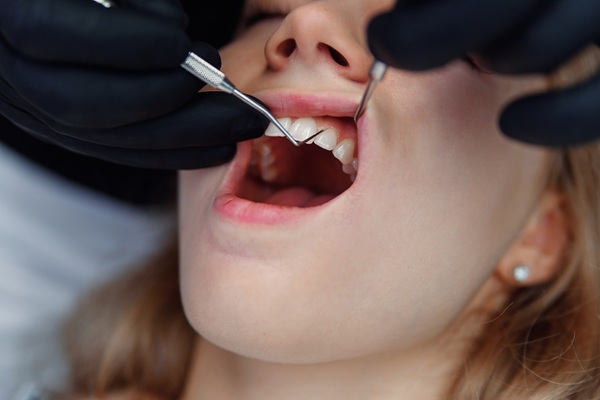Gum Disease: What You Should Know

Gum disease, also known as periodontal disease, poses a critical threat to your oral health when it is left untreated. While this oral health condition may seem mild, it can progress rapidly. Not only can gum disease affect your oral health, it can impact your overall health and quality of life. Understanding the consequences of gum disease and recognizing the importance of early prevention and treatment can help you maintain your smile and overall well-being.
Gingivitis: how gum disease begins
Gum disease starts with plaque buildup on the teeth. This sticky layer, made of bacteria from food and acid in your mouth, can harden into tartar if people do not remove it with daily brushing and regular dental cleanings. In the earliest stage of gum disease, also known as gingivitis, symptoms may include:
- Swollen or puffy gums
- Bright red or dark red gums, or gums that appear darker than usual
- Gums that bleed easily when brushing or flossing
- Tender gum tissue
- Chronic bad breath (halitosis)
At this point, the individual can reverse the effects of gum disease with a robust oral hygiene routine and professional dental treatment.
The progression to periodontitis
Gingivitis is treatable. However, when an individual ignores the symptoms, the gum disease can progress to periodontitis. This stage of gum disease is significantly more dangerous to the patient's oral and overall health. The inflammation spreads beneath the gum line, damaging the connective tissue and bone that support the teeth.
Pockets form between the gums and teeth, which collect bacteria and food debris, leading to further complications. Periodontitis often causes persistent bad breath, gum recession, and tooth mobility. Eventually, without treatment, the patient's teeth may begin to loosen and fall out.
How gum disease affects overall health
Gum disease does more than affect one's oral health. Untreated gum disease has been linked to several systemic health issues. Over the years, multiple research studies have found a strong association between periodontal disease and worsening chronic conditions, such as:
- Cardiovascular disease
- Diabetes
- Respiratory infections
- Adverse pregnancy outcomes
- Alzheimer's disease
The chronic inflammation and bacterial presence involved in gum disease can enter the bloodstream, contributing to complications in distant parts of the body. For individuals with pre-existing health conditions, untreated gum disease may exacerbate their symptoms and impede how they manage their disease.
Gum disease and how it impacts everyday life
The danger of gum disease also affects mental health and quality of life. Tooth loss and chronic oral pain can affect a person's speech, nutrition, self-esteem, and personal relationships. Deteriorating oral health can have a significant psychological impact, especially for older adults who often struggle with limited mobility, independence, and self-confidence.
Prevention and treatment
Prevention and early detection remain the most effective strategies against gum disease. Regular dental visits, professional deep cleanings, and consistent oral hygiene practices can identify signs of gum disease before it progresses. The dentist may recommend deep cleaning procedures such as scaling and root planing, along with antibacterial treatments, to manage and reverse early signs of gum disease. In advanced cases, the patient may undergo surgical procedures to restore their oral health and overall quality of life.
Call our office to schedule an appointment
When left untreated, gum disease can significantly impact your oral and overall health. Fortunately, Southbury Dental Care offers gum disease treatment in the Southbury area, helping to restore the health of your smile. Call our office to learn more about our services or to schedule your next appointment.
Request an appointment here: http://www.southburydental.com or call Southbury Dental Care at (203) 278-5337 for an appointment in our Southbury office.
Check out what others are saying about our dental services on Yelp: Gum Disease in Southbury, CT.
Related Posts
Anyone who has ever had gum disease knows that it can have serious consequences. If you have the signs and symptoms of this condition, you should act now and start treating it. In the early stages, it is possible to cure it and restore the full health of your gums. Waiting too long could have…
The goal of preventive dentistry is to keep teeth and gums clean and healthy in order to reduce the risk of cavities and other oral health concerns developing. It is a good idea to have a full understanding of how preventive dentistry can protect your smile and what services a dentist may recommend for cavity…
Spacers are often needed in orthodontics to help enhance the entire treatment process. A lot of people have a need for spacers to ensure that their orthodontic treatment goes to plan. This addition to braces or aligners may be recommended by a general dentist. This article outlines what spacers are, how they work, and when…
General dentists provide essential care to support oral health at every age, including well into adulthood and throughout the golden years. The goal is to help keep the smile in good shape so that it stays healthy, comfortable, and functional. Dental professionals can also address age-related oral health concerns, keeping you on track for a…
